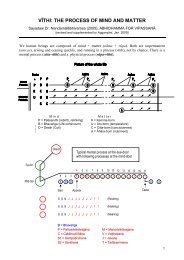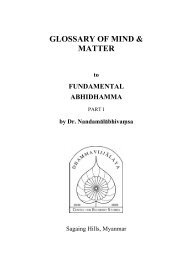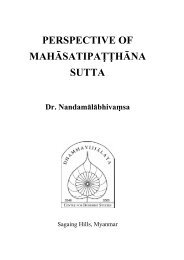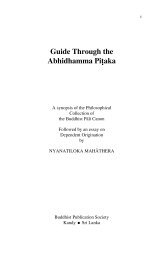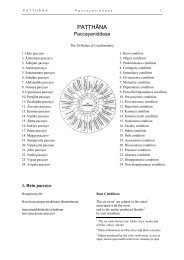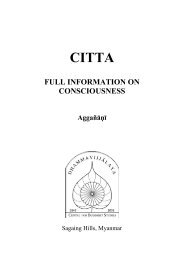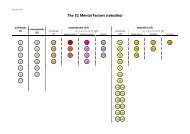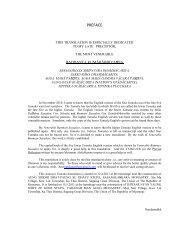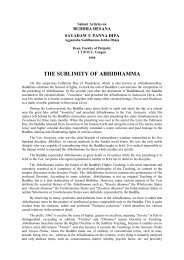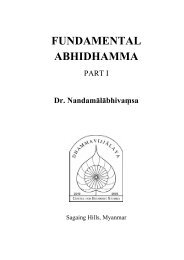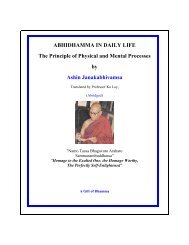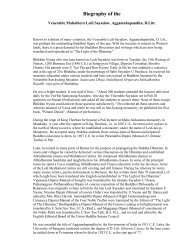Process of Consciousness and Matter - Abhidhamma.com
Process of Consciousness and Matter - Abhidhamma.com
Process of Consciousness and Matter - Abhidhamma.com
You also want an ePaper? Increase the reach of your titles
YUMPU automatically turns print PDFs into web optimized ePapers that Google loves.
I. CONSCIOUSNESS AND ITS FACTORS<br />
One underst<strong>and</strong>s <strong>and</strong> gives names to these according to their shape,<br />
form, colour etc. However, the <strong>Abhidhamma</strong> teaching maintains that<br />
these notions do not possess ultimate validity. The objects that they<br />
signify do not exist in their own right as irreducible realities. Their<br />
mode <strong>of</strong> being is conceptual, not actual. They are products <strong>of</strong> mental<br />
construction (parikappanā), not realities existing by reason <strong>of</strong> their<br />
own nature.<br />
Ultimate realities, however, exist by reason <strong>of</strong> their own intrinsic<br />
nature (sabhāva). These are all those <strong>of</strong> mental <strong>and</strong> material<br />
phenomena that are the final irreducible <strong>com</strong>ponents <strong>of</strong> existence, the<br />
entities that result from right analysis <strong>of</strong> the phenomenal world. Thus,<br />
just as one extracts oil from sesame seed, so one can extract the<br />
ultimate realities from the conventional realities. The ultimate<br />
realities, therefore, are characterised not only from the ontological<br />
perspective as the true ultimate entities but also from the<br />
epistemological perspective as the ultimate object <strong>of</strong> right knowledge.<br />
For example, a so called “being”, “man” or “woman” is a conceptual<br />
or conventional reality. In fact, however, the “being”, “man” or<br />
“woman” is just a <strong>com</strong>bination <strong>of</strong> ultimate realities. When we<br />
analyses such conceptual or conventional realities in the light <strong>of</strong> the<br />
<strong>Abhidhamma</strong>, we find that they do not possess any ultimate truth,<br />
even though this might appear to be strongly implied by the concepts.<br />
They are merely a conventional reality <strong>com</strong>prising <strong>of</strong> an assemblage<br />
<strong>of</strong> ever changing factors, <strong>of</strong> mental <strong>and</strong> physical processes. Thus, by<br />
examining the conventional realities with wisdom, we will finally<br />
<strong>com</strong>e to realise that it is only the ultimate realities (paramattha<br />
dhamma) that maintain their intrinsic nature independently.<br />
The word paramattha is a <strong>com</strong>pound form <strong>of</strong> parama <strong>and</strong> attha.<br />
Parama is defined as immutable (aviparīta) or abstract (nibbattita).<br />
Attha means thing. Although the term immutable is used here, this<br />
should not be interpreted as saying that all ultimate realities are eternal<br />
or permanent. In fact, all mental <strong>and</strong> material forces are subject to<br />
change, they are impermanent <strong>and</strong> in fact are constantly changing.<br />
However, their distinctive characteristics are the same whenever they<br />
10




